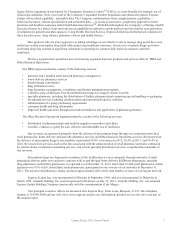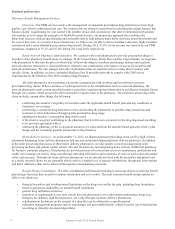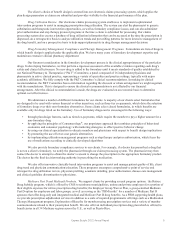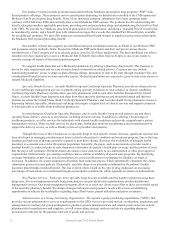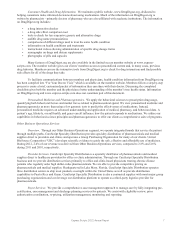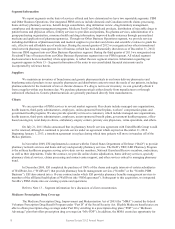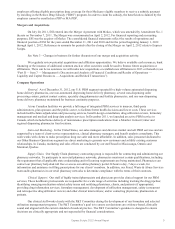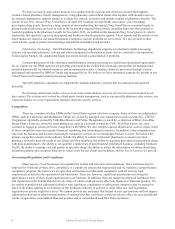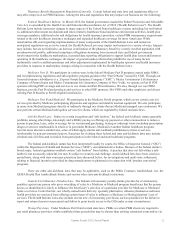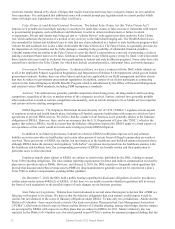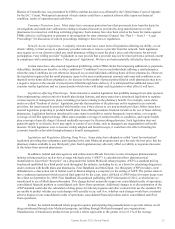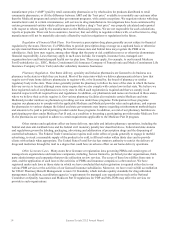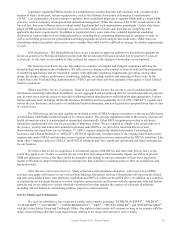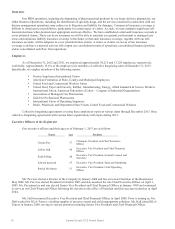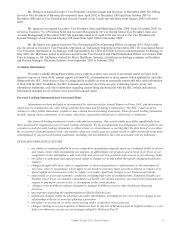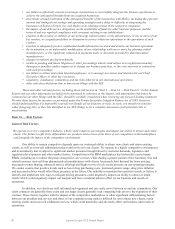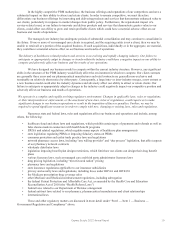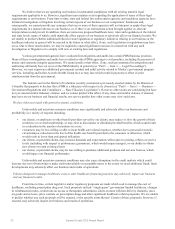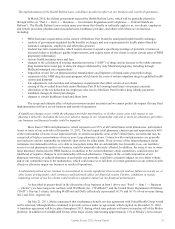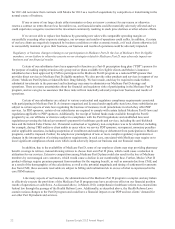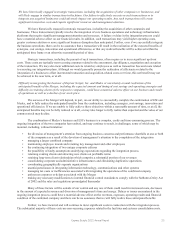Express Scripts 2012 Annual Report Download - page 15
Download and view the complete annual report
Please find page 15 of the 2012 Express Scripts annual report below. You can navigate through the pages in the report by either clicking on the pages listed below, or by using the keyword search tool below to find specific information within the annual report.Express Scripts 2012 Annual Report 13
District of Columbia law was preempted by ERISA and that decision was affirmed by the United States Court of Appeals
for the D.C. Circuit. Widespread enactment of such statutes could have a material adverse effect upon our financial
condition, results of operations and cash flows.
Consumer Protection Laws. Most states have consumer protection laws that previously have been the basis for
investigations and multi-state settlements relating to financial incentives provided by drug manufacturers to retail
pharmacies in connection with drug switching programs. Such statutes have also been cited as the basis for claims against
PBMs either in civil litigation or pursuant to investigations by state Attorneys General. See “Part I — Item 3 — Legal
Proceedings” for discussion of current proceedings relating to these laws or regulations.
Network Access Legislation. A majority of states now have some form of legislation affecting our ability, or our
clients’ ability, to limit access to a pharmacy provider network or remove a provider from the network. Such legislation
may require us or our clients to admit any retail pharmacy willing to meet the plan’s price and other terms for network
participation (“any willing provider” legislation) or may provide that a provider may not be removed from a network except
in compliance with certain procedures (“due process” legislation). We have not been materially affected by these statutes.
Certain states have also enacted legislation prohibiting certain PBM clients from imposing additional co-payments,
deductibles, limitation on benefits, or other conditions ("Conditions") on covered individuals utilizing a retail pharmacy
when the same Conditions are not otherwise imposed on covered individuals utilizing home delivery pharmacies. However,
the legislation requires that the retail pharmacy agree to the same reimbursement amounts and terms and conditions as are
imposed on the home delivery pharmacies. An increase in the number of prescriptions filled at retail pharmacies may have
a negative impact on the amount of prescriptions filled through home delivery. It is anticipated that additional states will
consider similar legislation and we cannot predict which states will adopt such legislation or what effect it will have.
Legislation Affecting Plan Design. Some states have enacted legislation that prohibits managed care plan sponsors
from implementing certain restrictive benefit plan design features, and many states have introduced legislation to regulate
various aspects of managed care plans, including provisions relating to the pharmacy benefit. For example, some states,
under so-called “freedom of choice” legislation, provide that members of the plan may not be required to use network
providers, but must instead be provided with benefits even if they choose to use non-network providers. Other states have
enacted legislation purporting to prohibit health plans from offering members financial incentives for use of home delivery
pharmacies. Legislation has been introduced in some states to prohibit or restrict therapeutic intervention, or to require
coverage of all FDA approved drugs. Other states mandate coverage of certain benefits or conditions, and require health
plan coverage of specific drugs if deemed medically necessary by the prescribing physician. Such legislation does not
generally apply to us directly, but it may apply to certain of our clients, such as managed care organizations and health
insurers. If such legislation were to become widely adopted and broad in scope, it could have the effect of limiting the
economic benefits achievable through pharmacy benefit management.
Legislation and Regulation Affecting Drug Prices. Some states have adopted so-called “most favored nation”
legislation providing that a pharmacy participating in the state Medicaid program must give the state the best price that the
pharmacy makes available to any third-party plan. Such legislation may adversely affect our ability to negotiate discounts
in the future from network pharmacies.
In addition, federal and state agencies and enforcement officials from time to time investigate pharmaceutical
industry pricing practices such as how average wholesale price (“AWP”) is calculated and how pharmaceutical
manufacturers report their “best price” on a drug under the federal Medicaid rebate program. AWP is a standard pricing
benchmark (published by a third party) used throughout the industry, including by us, as a basis for calculating drug prices
under contracts with health plans and pharmacies. First DataBank and Medi-Span, two third-party AWP providers, were
defendants in a class action suit in federal court in Boston alleging a conspiracy in the setting of AWP. The parties entered
into a settlement agreement which received final approval by the court, and a roll-back of AWP prices for many drugs went
into effect on September 26, 2009. First DataBank discontinued publishing AWP information in 2011, at which time we
transitioned to use of Medi-Span information. This change did not materially impact our consolidated results of operations,
consolidated financial position or consolidated cash flows from operations. Additional changes to or discontinuation of the
AWP standard could alter the calculation of drug prices for federal programs and other contracts that use the standard. We
are unable to predict whether any such changes will actually occur, and if so, whether such changes would have a material
adverse impact on our consolidated results of operations, consolidated financial position and/or consolidated cash flow
from operations.
Further, the federal Medicaid rebate program requires participating drug manufacturers to provide rebates on all
drugs reimbursed through state Medicaid programs, including through Medicaid managed care organizations.
Manufacturers of brand name products must provide a rebate equivalent to the greater of (a) 23.1% of the average


